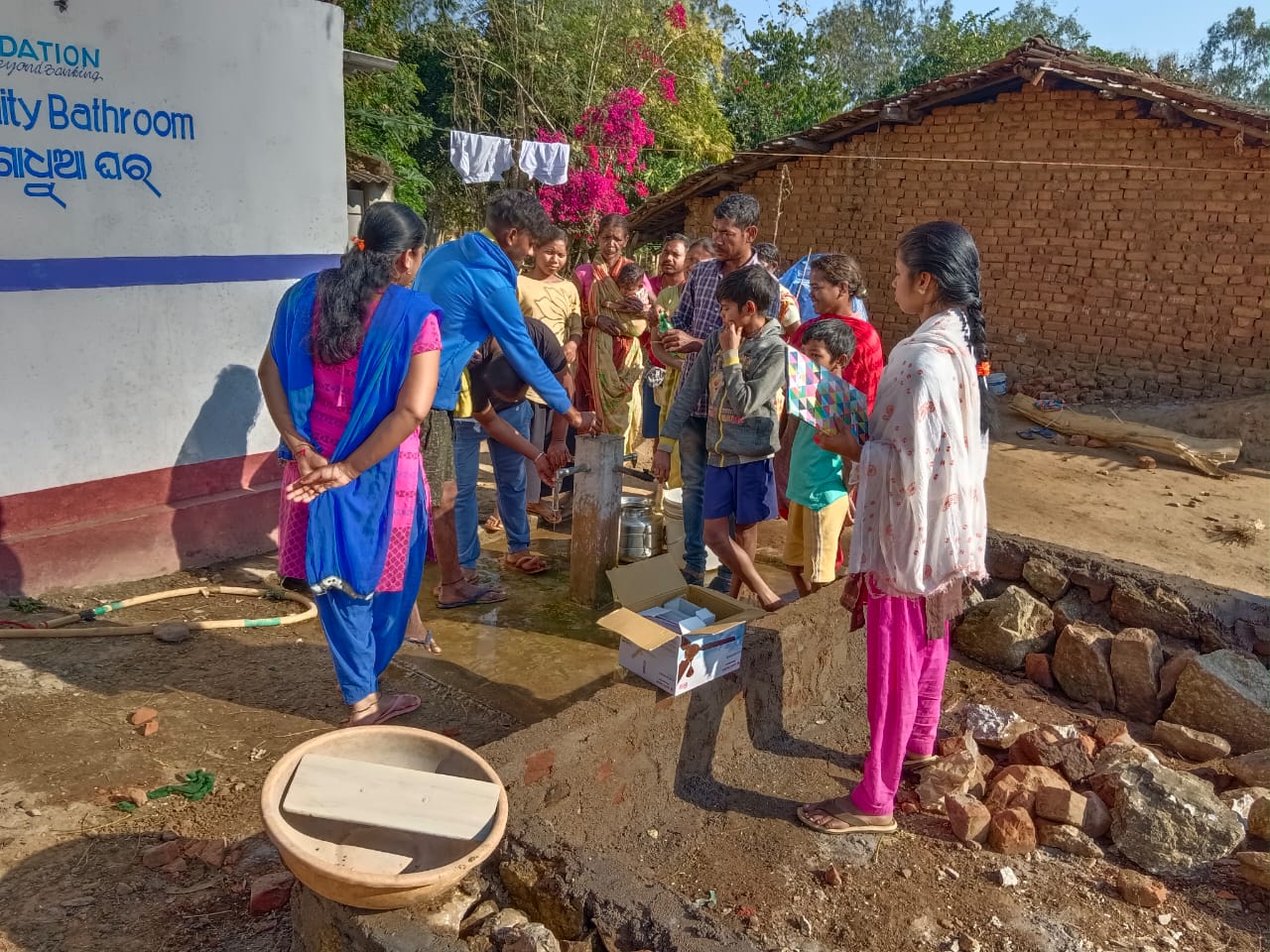Remote village communities of Lanjigarh reduce groundwater contamination
StoryBy Chandrika Patnaik
29 March 2023
Kalahandi’s Adivasi communities regularly monitor their water sources and practice safe sanitation to reduce water contamination.

The volunteers testing the water quality using Field Testing Kits (FTK).
Photograph by Rudra Majhi
“Children and adults suffer from bouts of cholera and jaundice every year. It’s a recurrent health problem most households face, even though we use water from the tube well”, says Budhi Tandi, the 41-year-old President of the Talbora Village Development Committee (VDC) in Lakhbahali Gram Panchayat.
Talbora is one of the five remote Adivasi villages in Lanjigarh Block of Kalahandi district implementing the SBI Gram Seva programme in partnership with Gram Vikas. Rughaguda, Thuangapadar, Rangiguda and Lermuhi are the other four villages. The 399 households in the five villages rely on tube wells for their drinking water needs.
Contaminated water risks health
The five villages have tube wells installed to supply drinking water. These are installed at various depths, depending on the availability and groundwater level. They extract freshwater from subsurface or deeper groundwater aquifers.
In many cases, the immediate environmental conditions make it unfavourable for them to get clean water. For instance, the distance of tube wells from latrines or wastewater percolating into the ground contaminates the tube well and dug well water with human-pathogenic bacteria. But, residents prefer water from these sources, assuming it is safe for drinking.
However, the seepage of pollutants, bacteria, and human and animal waste into water bodies due to poor sanitation systems or rainwater runoff has led to gastrointestinal diseases like cholera, typhoid and dysentery among adults and children the past few years.
Partnership for better health
In April 2022, the village leaders approached Gram Vikas to address their water-related problems. Gram Vikas had partnered with these villages since January 2022 to implement the Integrated Village Development initiative under the SBI-Gram Seva programme. The initiative seeks to roll out simultaneous interventions on health, education, WaSH, skill and livelihood development, women empowerment, youth development, community engagement, infrastructure and environment and digitisation.
Gram Vikas trained two community youth selected as Water Quality Management (WQM) volunteers, by each of the five VDCs, on water quality testing using Field Testing Kits (FTK). The WQM volunteers tested water from the tube wells and dug wells for nitrate, bacteria and fluoride contamination.
“We started testing water for each contaminant from all the tube wells and dug wells in our village,” says Padma Majhi, 26, a WQM volunteer selected by the Thuangapadar VDC. “The data collected from the first test result in May 2022 indicated bacteria and nitrate contamination in all 32 water sources used by the residents. The tests were conducted in front of the VDC members and SHG, and shared with the residents during a village meeting,” adds Padma, one of the eleven WQM volunteers selected by the five VDCs.
The volunteers conducted tests at the source every quarter to assess the water quality. In August 2022, the volunteers tested the water again, finding bacteria and nitrate contamination.
Community action for safe water
Budhi Tandi says that after the second quarter test results, the Bal Sabha and adolescent groups volunteered to keep the area around the tube wells and dug wells clean. They initiated monthly cleaning drives for all the water sources too.
The community then constructed raised platforms around 27 tube wells to avoid direct seepage of contaminated water under the ground. They also built guard walls and platforms for seven dug wells in the five villages.
By the third quarter, in November 2022, the evaluation tests indicated substantial improvement in the water quality in these villages. The bacteria and nitrate contamination in the 32 sources had reduced to 12.5% in the third quarter from 87.5% in the second quarter.
Strengthening measures for safe water
The villages took more measures to ensure water safety, such as constructing community bathing rooms. “The community bathing rooms help women to bathe in comfort and privacy. Earlier, women and girls in our village took bath next to the tube well by the roadside. Since these bathing rooms are at a distance, our water sources are also safe from contamination”, says 30-year-old Sairendri Naik, a member of Maa Bandaraja SHG in Rangiguda village.
The communities are also taking measures to prevent stagnant water accumulation in their villages to stop mosquito breeding and foul smell.
The VDC members and residents in these villages decided to divert the wastewater to nearby nutrition gardens. “We hope to use the wastewater to grow vegetables. This initiative will help us use the wastewater productively,” says Budhi Tandi of the VDC in Talbora village.
Community bathing room facility constructed in Thuangpadar village.
Photograph by Sunil Thomas
ACKNOWLEDGEMENT
Sunil Thomas, Project holder helped with data collection for the story. Mark Lancy Sebastian edited the story.
ABOUT THE AUTHOR
Chandrika Patnaik leads content production within the Communications team in Gram Vikas.
RELATED BLOGPOSTS
Turning losses into gains: How Mallipanka farmers find success in new crops
Reviving agriculture: Mallipanka’s first strawberry farm story.
Ensuring dignity beyond life: supporting migrant families in their darkest hours
Gram Vikas ensures safe migration and dignified repatriation for deceased migrant workers, supporting bereaved families.
Collective leadership transforms ageing overhead water tank to secure household water supply for all
Kalakhadi’s aging overhead tank revived through collective leadership, ensuring sustainable water supply for the community.